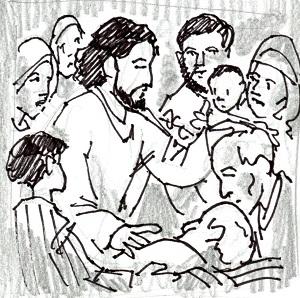

“Everyone is looking for you” (Mark 1:37).
Heb 2:14-18; Mark 1:29-39
We do not need proof to know that physical contact and affection are a key to health. From birth, babies that are held and touched thrive while those that are neglected do not. Human beings bloom when they fall in love or experience intimate friendship. Without relationships, human development is arrested and vulnerability to illness and personality disorders increases.
It is clear from the Gospels that Jesus was physically accessible and personally involved with people, immersing himself in crowds, touching and being touched, embracing lepers, social outcasts and the unwashed poor shunned by the elites in a religious culture obsessed with ritual purity and fear of moral contagion. He intimately ministered to blind, deaf and dumb people, was unfazed by the scandalous touch of the woman who anointed and wept over him. He welcomed children, intimate proximity with sinners at table and with his own disciples, one of whom rested his head on his chest during the last supper.
In today’s Gospel, Mark seems intent to show us how sensitive, even sensual Jesus was as he moved among the throngs of sick people, his voice and hands soothing them, commanding illness and unclean spirits to depart. Jesus is spiritually at work as Lord and Creator, and any physical or verbal contact with him restores broken and wounded bodies to their original wholeness and the state of grace God intended before sin and its many manifestations invaded humanity. Mark’s message is that this is what the Incarnation does. Jesus’ immersion in our shared humanity restores the original blessing and the divine likeness defaced by human estrangement from God.
The author of Hebrews makes it plain. “Since the children share in flesh and blood, Jesus likewise shares in them, that through death he might destroy the one who has the power of death, the Devil” (2:14). Jesus took our flesh in order to experience the same suffering we experience. His victory over sin and death therefore becomes our victory, our healing and liberation. “Because he himself was tested through what he suffered, he is able to help those who are being tested” (2:18).
This is the meaning of the Incarnation and its sacramental sign in the Eucharist, that we enter an intimate flesh and blood union with the crucified and risen Jesus. He perfects our humanity to enable us to share his divinity. This also highlights our flesh and blood solidarity with all human beings and our belief that God’s mercy can overcome death and forgive even the most egregious of human sins.
This is the basis for Catholic social justice teaching, which commits us to protecting the dignity of all life and the bonds that unite the entire human community by flesh and blood, justice and love. By virtue of our common humanity and the redemption won for us by Jesus, we are one body, children of God, destined for union with God.
Advertisement








